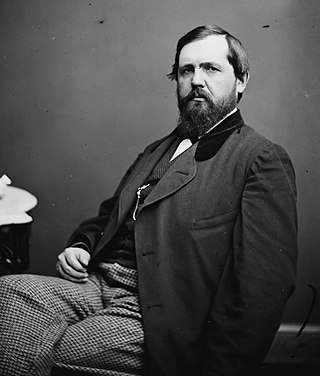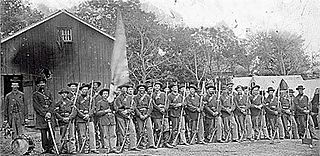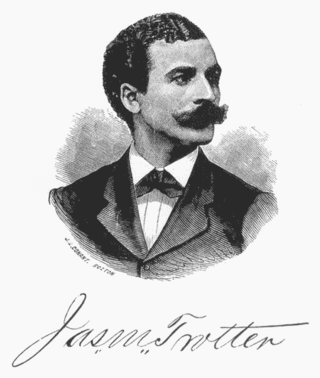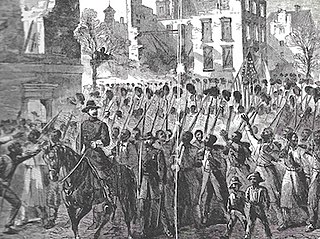
William Harvey Carney was an American soldier during the American Civil War. Born enslaved, he was awarded the Medal of Honor in 1900 for his gallantry in saving the regimental colors during the Battle of Fort Wagner in 1863. The action for which he received the Medal of Honor preceded that of any other African American Medal of Honor recipient; however, his medal was actually one of the last to be awarded for Civil War service. Some African Americans received the Medal of Honor as early as April 1865.

The 54th Massachusetts Infantry Regiment was an infantry regiment that saw extensive service in the Union Army during the American Civil War. The unit was the second African-American regiment, following the 1st Kansas Colored Volunteer Infantry Regiment, organized in the Northern states during the Civil War. Authorized by the Emancipation Proclamation, the regiment consisted of African-American enlisted men commanded by white officers. The 54th Massachusetts was a major force in the pioneering of African American civil war regiments, with 150 all black regiments being raised after the raising of the 54th Massachusetts.

Willis Arnold Gorman was an American lawyer, soldier, politician, and a general in the Union Army during the American Civil War.

Robert Gould Shaw was an American officer in the Union Army during the American Civil War. Born into a abolitionist family from the Boston upper class, he accepted command of the first all-black regiment in the Northeast. Supporting the promised equal treatment for his troops, he encouraged the men to refuse their pay until it was equal to that of white troops' wage.

Edward "Ned" Needles Hallowell was an officer in the Union Army in the duration of the American Civil War, commanding the 54th Massachusetts Volunteer Infantry following the death of Colonel Robert Gould Shaw at the Second Battle of Fort Wagner in 1863.

Charles Francis Adams Jr. was an American author, historian, and railroad and park commissioner who served as the president of the Union Pacific Railroad from 1884 to 1890. He served as a colonel in the Union Army during the American Civil War. After the war, he was a railroad regulator and executive, an author of historical works, and a member of the Massachusetts Park Commission.

George Luther Stearns was an American industrialist and merchant in Medford, Massachusetts, as well as an abolitionist and a noted recruiter of black soldiers for the Union Army during the American Civil War.

Edwin Hanson Webster was a U.S. Congressman from Maryland, serving the second district for two terms from 1859 until 1865. Prior to the American Civil War, Webster was a lawyer and Maryland state senator from 1855 to 1859. In the summer of 1862, he recruited the 7th Maryland Infantry Regiment and served as colonel until he returned to Congress on January 1, 1863. He resumed command of the regiment from March 4, 1863 and resigned his commission in September to return to Congress. In 1864, he drafted a military code for the Maryland state militia. After July 1865, he was twice a collector of customs at Baltimore, a lawyer in private practice and president of the Harford National Bank in Harford County, Maryland.

The 44th Indiana Infantry, an American Civil War regiment, was organized at Fort Wayne, Indiana, on October 24, 1861, with Hugh B. Reed, a Fort Wayne druggist, as colonel, and officially mustered in on November 22, 1861. It was composed mostly of volunteers from what was then Indiana's Tenth Congressional District in the northeastern part of the state. In December, the regiment left for Henderson, Kentucky. It camped at Calhoun, Kentucky, until February 1862, when it moved to Fort Henry, Tennessee, then to Fort Donelson, Tennessee, where it participated in the siege of the fort, taking heavy casualties there.

The Commonwealth of Massachusetts played a significant role in national events prior to and during the American Civil War (1861–1865). Massachusetts Republicans dominated the early antislavery movement during the 1830s, motivating activists across the nation. This, in turn, increased sectionalism in the North and South, one of the factors that led to the war. Politicians from Massachusetts, echoing the views of social activists, further increased national tensions. The state was dominated by the Republican Party and was also home to many Republican leaders who promoted harsh treatment of slave owners and, later, the former civilian leaders of the Confederate States of America and the military officers in the Confederate Army.

William Adams was a noted American clergyman and academic.
The 54th Pennsylvania Volunteer Infantry was an infantry regiment which served in the Union Army during the American Civil War.

James Monroe Trotter was an American teacher, soldier, employee of the United States Post Office Department, a music historian, and Recorder of Deeds in Washington, D.C. Born into slavery in Mississippi, he, his two sisters and their mother Letitia were freed by their master, the child's father, and helped to move to Cincinnati, Ohio. He grew up in freedom, attending school and becoming a teacher.
William Hord Worthington was an American lawyer, farmer and military officer. During the American Civil War, he was the first commanding officer of the 5th Iowa Volunteer Infantry Regiment.
First Sergeant Robert John Simmons was a Bermudian who served in the 54th Massachusetts Volunteer Infantry Regiment during the American Civil War. He died in August 1863, as a result of wounds received in an attack on Fort Wagner, near Charleston, South Carolina.

Alfred Stedman Hartwell was a lawyer and American Civil War soldier, who then had another career as cabinet minister and judge in the Kingdom of Hawaii.
The following list is a Bibliography of American Civil War Union military unit histories. More details on each book are available at WorldCat.

John Ritchie was an American Union Army officer, traveler and diarist. He served in the 54th Regiment Massachusetts Volunteer Infantry during the American Civil War.

The 55th Massachusetts Infantry Regiment was the sister regiment of the renowned Massachusetts 54th Volunteers during the latter half of the American Civil War. The enactment of the Emancipation Proclamation by United States President Abraham Lincoln on January 1, 1863 opened the way for the enlistment of free men of color and newly liberated slaves to fight for their freedom within the Union Army. As the ranks of the 54th Massachusetts quickly reached its full complement of recruits, an overflow of colored volunteers continued to pour in from several other states outside Massachusetts — many of whom simply had not arrived in time — prompting Governor John Albion Andrew to authorize yet another regiment of colored soldiers sponsored by the Commonwealth. Lieutenant Colonel Norwood P. Hallowell of the 54th Massachusetts was promoted to colonel and appointed commander of the 55th Massachusetts on May 30, 1863. Five companies of the 55th Massachusetts were mustered into service on May 31; two more companies were mustered in on June 15; and the last three on June 22.
James Jackson Higginson was an American stockbroker and soldier who was imprisoned at Libby Prison for nine months during the Civil War.














